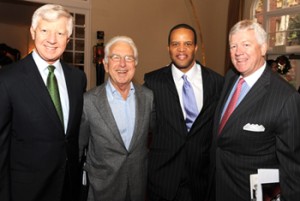The more you give, the happier you are
 A remarkable event occurred just a couple weeks ago at USC Marshall School of Business. Three titans of leadership – Warren Bennis, Bill George, and John Hope Bryant gathered to share their insights on emerging leadership practices and what it’s really going to take to reset the economy and re-establish trust in the financial sector, and it’s not rocket science. According to the panel we need to restore collaboration, trust, humility, passion, and purpose – and no, it wasn’t Robert Fulghum on stage, but the message remains the same.
A remarkable event occurred just a couple weeks ago at USC Marshall School of Business. Three titans of leadership – Warren Bennis, Bill George, and John Hope Bryant gathered to share their insights on emerging leadership practices and what it’s really going to take to reset the economy and re-establish trust in the financial sector, and it’s not rocket science. According to the panel we need to restore collaboration, trust, humility, passion, and purpose – and no, it wasn’t Robert Fulghum on stage, but the message remains the same.
John Hope Bryant is the author of Love Leadership: The New Way to Lead in a Fear Based World, and Chairman and CEO of Operation HOPE Inc., a non-profit social investment banking organization self-help provider of economic empowerment tools and services for the underserved. He has a powerful message that ultimately you must ask yourself, “Does my work matter? Am I making a difference?” John encourages people everywhere to abandon the pervasive selfish attitudes that dominate contemporary thinking – the ‘what’s in it for me?’ attitudes, and instead focus on what you can contribute.
Bryant urges us all to shift our thinking to how we can contribute, how we can give, how we can ease suffering, enlighten others, and offer our time, interactions and energy to giving. In his work, he sees time and again that those who give without concern or interest for WIIFM, always wind up healthier, happier and spiritually (and economically too) richer.
Not convinced? Consider this research paper on happiness by Elizabeth Dunn, Lara Aknin, and Michael Norton published in Science Magazine. The basis for the study was the supposition that people’s happiness is more affected by their behavior, than by their income level. Most people are familiar with the consistent research that once basic food and security needs are met, money does not equal happiness. Their proposal was that what we do with the money and resources we do have, has a greater affect on how we feel than the amount of resources we have available. In one section of the study they followed people who were receiving bonuses of various amounts, and tracked what they did with it. Some paid bills or the mortgage, or treated themselves to something special, while others gave to charity or bought gifts for others. This kind of charitable or gifting behavior they called “prosocial.” Take the results to heart, “Employees who devoted more of their bonus to prosocial spending experienced greater happiness after receiving the bonus, and the manner in which they spent that bonus was a more important predictor of their happiness than the size of the bonus itself.”
You can see the entire panel discussion here. Enjoy!


